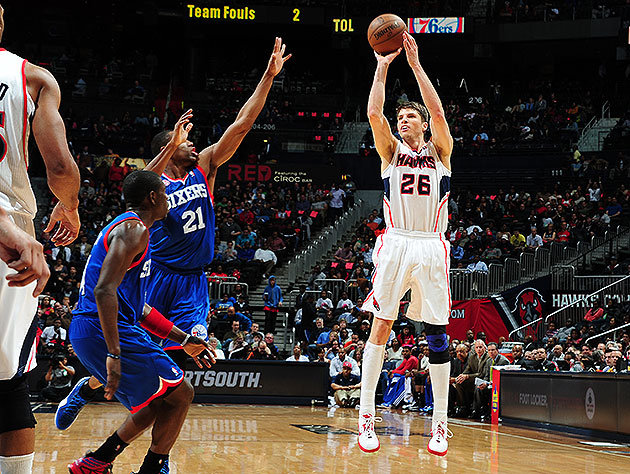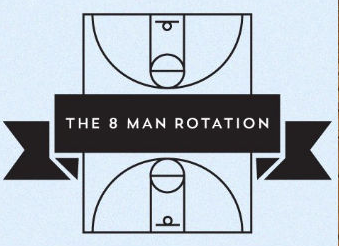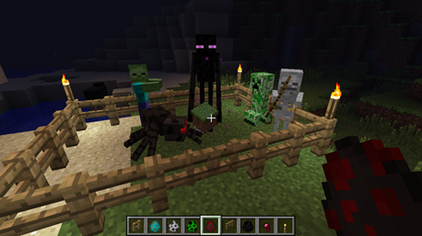At the (continuing) risk of alienating blog readers who are not the least interested in the connections between sports and HR and the workplace (come on, get with it people), I felt compelled to go back to the NBA well one more time to share a sliver of a fantastic piece in Grantland about the Atlanta Hawks' Kyle Korver.
For the uninitiated, Korver is a 33 year old veteran player about to enter his 12th season in the NBA, after completing 4 years as a college player at Creighton. He has played for 4 different teams in his career, and was notably traded before ever playing a game in the NBA by the Nets, the team that originally drafted him to the 76ers in exchange for $125,000 - enough cash to fund the Nets' summer league team and buy some office equipment. He then bounced around the league somewhat, making stops in Philly, Utah, and Chicago before joining the Hawks in 2012. 
Since becoming a Hawk, and in particular since the Hawks have adopted a more open, fast-paced, spread the court and shoot 3-pointers type of offensive style, Korver has enjoyed something almost unheard of with professional basketball players on the wrong side of 30 - he is getting better. Korver's scoring average, shooting percentages, and most notably his 3-point shooting percentages have all gone up each of the last 3 seasons, just when most players his age are declining to a point where few even remain in the league.
To what can you attribute this remarkable late-career renaissance for Korver?
Probably to three things, two that are basketball specific but have relevance to pretty much any kind of workplace, and one other that is strictly a personal development play, and too has relevance to anyone looking to improve their performance in their job.
One - The league in general has adopted a style of play that suits Korver's natural talents more so than it did even just 5 or 7 years ago. Teams are favoring a more open game, are spacing the floor to free up 3 point shooting, and relying less on dominant center oriented offense. Through a combination of rule changes and a focus on analytics that values a high percentage 3 point shot over almost any other kind of shot, Korver has found himself a valuable niche in the current NBA. For the rest of us, the lesson is about finding that correct industry or type of work that fits with what we are naturally good at or inclined to enjoy. It sounds really simple, and it should be, but we all have probably spent longer than we care to admit in jobs or at companies that were not 'right.'
Two - The Hawks, Korver's current team, and their head coach John Budenholzer are installing specific patterns and plays to take advantage of Korver's skills, and that more often than not place him in a position where he or his teammates have the best chance for success. Often non-star players do not get much opportunity to showcae their talents, as most NBA teams orient their game plans around the strengths and preferences of their star players. It is not that role players like Korver are not capable, it is just that they often get limited opportunities. Here is a quote from the Grantland piece:
No coach has unleashed the full breadth of Korver’s game like Budenholzer. Korver isn’t a traditional pick-and-roll player; he can’t dribble the ball 25 feet to the rim, juking dudes along the way. But Budenholzer has tailored a sort of hybrid species of pick-and-roll to his secret star — a high-speed curling action in which Korver takes a pitch or a handoff, probes the defense with a dribble or two, and makes the next pass from there.
This is the classic, 'never get a chance to show what I can do' problem that happens in many workplaces. You can either get stuck as too much of a specialist, thus becoming too valuable for the one thing that you do well, but might not be too excited about, or you can fight and push and volunteer for projects that will simultaneously energize you and raise your overall value. Even if you work for the man, sometimes you have to make the man work for you.
Three - Korver probably works harder at getting better at his job than most of us work at getting better at ours. Work ethic is sometimes a tough thing to assess and then to value. Often it isn't about the level of effort that goes into doing the actual work, in Korver's case actually playing the games, but rather what someone is willing to do when they are 'off the clock' so to speak. What are they working on? What are they reading and researching? How far are they willing to push and explore in order to improve? One more bit from the Grantland piece shows what this means to a guy like Korver:
Korver is also willing to test himself in unconventional ways. Elliott introduced him to misogi, the Japanese annual purification ritual some athletes have adapted into a once-a-year endurance challenge. Korver and Elliott stand-up paddled 25 miles from the Channel Islands to Santa Barbara last year. Korver may have one-upped himself with themisogi he did this summer.
Big-wave surfers build lung capacity by holding a large rock, sinking to the bottom of the ocean, and running short distances on the ocean floor. Korver and four friends decided to go back to the Channel Islands, find an 85-pound rock, and run a collective 5K holding the thing underwater. Each participant would dive down, find the rock, run with it as long as he could, and drop it for the next guy to find. Those waiting their turn wore weight belts and tread in water between five and 10 feet deep.
It took five hours. “We were honestly worried about blacking out,” Korver says. They were also worried about sharks.
“He wants to turn over every stone, and try every possible thing that might make him better — as a player and a person,” Elliott says.
Get that? A group 5K, underwater, while carrying a 85 pound rock and hoping you don't black out and/or get eaten by a shark. That is work ethic. That is wanting to get better. That is the kind of approach, in combination with the right system and organization, that allows a 33 year old shooter to keep getting better when decades of NBA history says he should be getting worse.
How far are you willing to go to get better?


 Steve
Steve



